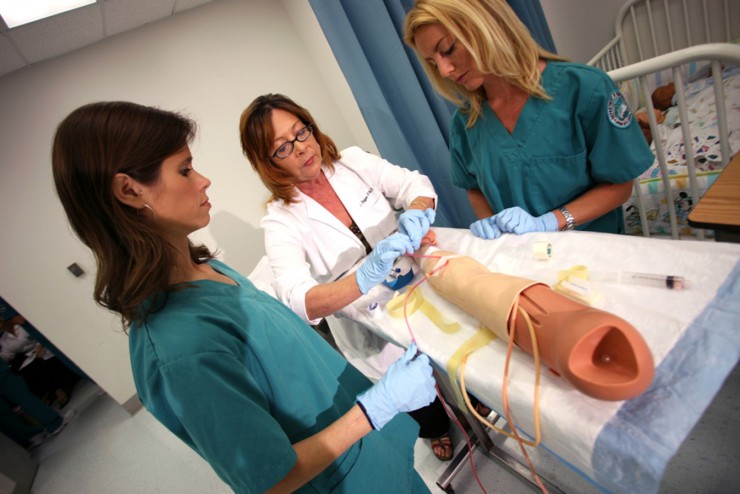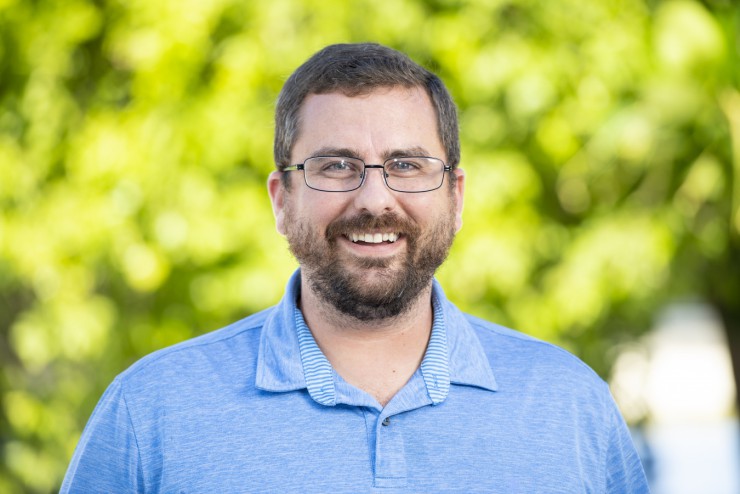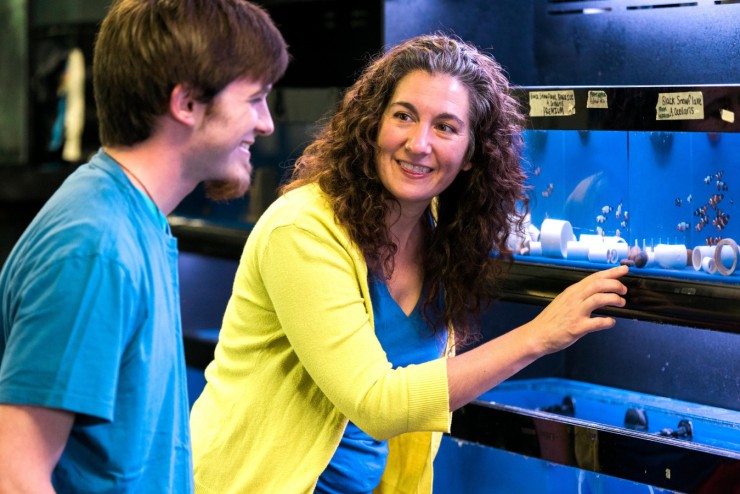Meet Our Faculty
-
Lucja Rice
Diving Business & Technology Faculty

Scuba diving has been a passion of Lucja Rice for 24 years. She has been a dive professional since 2000, working as a Divemaster and Dive Instructor in Egypt, Cyprus, Croatia, Norway, Poland, and the USA. She is a Master Instructor with Professional Association of Diving Instructors (PADI), and Technical Diving Instructor with Technical Diving International (TDI), Instructor Trainer with Emergency First Response (EFR) and she is also Divers Alert Network (DAN) Instructor. She earned her Bachelor’s Degree in Hotel Management in 2001 and Master’s Degree in Tourism Economics in 2004 at The School of Economics in Warsaw, Poland.
Rice is currently employed as a full-time faculty for AAS Diving Business and Technology program at The College of the Florida Keys teaching a full range of courses from basic scuba diving to instructor level courses. She has more than 5,000 dives, over 40 diving certifications and has trained more than 1,200 students. Rice continues her professional development, including training in technical and closed-circuit rebreather diving. She always looks for opportunities to challenge herself during diving experiences with deeper, more complex dives.
-
Julie Sagan
Nursing Faculty

-
Amber Severson
Math Faculty
"All students deserve to learn meaningful mathematics. Students that have opportunities that promote investigation, discourse, and empowerment gain experiences that will improve mathematical skills, conceptual understanding, and problem solving strategies. Maintaining high expectations along with these experiences and opportunities promotes learning mathematics and student success."
Bio:
Amber Severson enjoys working with students and teaching mathematics at The College of the Florida Keys. She has a background in Mathematics Education and Teacher Preparation. She earned a master’s and a bachelor’s degree in Mathematics Education from Bemidji University and completed graduate work was at the University of Minnesota.
Before teaching at CFK, Amber taught at Southwest Texas Junior College and at Anoka-Ramsey Community College, among other universities and high schools in Minnesota.
Mrs. Severson enjoys cooking and spending time with her family.
-
Angelo "Jason" Spadaro, Ph.D.
Marine Science Faculty

Dr. Spadaro holds a PhD in ecological sciences. His specialization and research focus on the effect of herbivores on coral reef communities and restoration ecology. Dr. Spadaro teaches the specialized coral reef ecology courses at CFK including Coral Reef Biology and Management, Restoration of Coral Reefs, and Coral Reef Assessment. Dr. Spadaro is also experienced and interested in aquaculture and stock enhancement for restoration.
-
Shannon Sperry, MSN, RN
Nursing Faculty
Shannon Sperry has worked in health care since 1974 and has developed expertise in emergency nursing and critical care. She holds an associate and a bachelor’s degree in Nursing as well as a Master’s of Nursing Education.
-
Dawn Torquemada
Nursing Faculty

Dawn Torquemada is a Certified Family Nurse Practitioner with experience in Emergency and Urgent Care. In her 25-year medical career history, she has been an Emergency Medical Technician, Trauma Nurse, Certified Emergency Nurse, and Charge Nurse. Her experience includes running an urgent care clinic, precepting Nurse Practitioner and Physician Assistant students, providing educational lectures in Emergency Medicine, and working with the Emergency Nurses Association on updating position statements as well as conducting community surveys.
Torquemada proudly contributes back to the community by volunteering with Shepherd’s Hope (volunteer doctors and nurses), Hope For Leukemia, Relay For Life, and other fundraisers.
-
Deborah Townsend, PhD, RN
Nursing Faculty
Dr. Deb Townsend began teaching at CFK in August 2014 in the Nursing department. Previously she had been working at Minot State University as an Associate Professor at Minot State University in Minot, North Dakota. Dr. Townsend has spent most of her career working as a mental health nurse. She has worked inpatient psychiatric nursing (17 years), as a psychiatric and mental health nurse practitioner (13 years), and for the past 20 years teaching psychiatric nursing. She remains board certified as a Psychiatric-Mental health Nurse Practitioner. In addition, since coming to CFK, she has taught Fundamentals of Nursing and Informatics in the RN-BSN program.
She has long been involved in the American Foundation for Suicide Prevention and has been instrumental in bringing the first walk to prevent suicide to the Florida Keys.
-
Michelle "Mick" Walsh, Ph.D.
Marine Science Faculty

Dr. Walsh strives to ally scientific, academic, stakeholder, and policy objectives of fisheries and aquaculture with an inclusive, multi-operational approach that involves fishermen, students, academia, managers, policymakers, industry, and the public to establish effective mechanisms for sustainable utilization and stewardship of these resources.
After completing her undergraduate degree at Rutgers University, Dr. Walsh worked as a laboratory technician for the National Oceanic and Atmospheric Administration (NOAA), National Marine Fisheries Service, at the Northeast Fisheries Science Center in Sandy Hook, NJ. This opportunity paved her career in fish culture, as working with the Life History and recruitment Group offered the experience of rearing local fishery - important marine species. Those species were reared to examine environmental influences on growth, development, morphology, and mortality of larvae and juveniles — ultimately contributing to the best scientific information available for use in fishery stock assessments.
Dr. Walsh’s experience then broadened to focus on hatchery and release strategies for flatfish stock enhancement both in the U.S. (as Graduate student at the University of New Hampshire) and Japan (where she spent 2 years as a Fulbright Graduate Research Fellow working with Japanese scientists, hatchery managers, and fishermen). Subsequently, she spent 3 years concentrating on sustainable seafood as a Fishery Policy Analyst for the Office of Sustainable Fisheries at NOAA Fisheries Service in Silver Spring, MD. Walsh’s research interests center on the early life of fish species, including nutritional requirements and feeding behavior.
-
Emily Weekley, Ph.D.
English Faculty

Emily Schulten Weekley is the author of Rest in Black Haw. Her work appears in Prairie Schooner, Colorado Review, The Missouri Review, Barrow Street, and Tin House, among others. Weekley earned her MA from Western Kentucky University and her PhD from Georgia State University. She received the 2016 Erskine J. Prize for Poetry and a Tennessee Williams Scholarship from the Sewanee Writers’ Conference.
At CFK, Dr. Weekly teaches Introduction to Creative Writing, Beginning Poetry Writing, Beginning Fiction Writing, English Composition I and II, and Advanced Communications in Business. She is also the advisor for the CFK Creative Writing Club and organizer of the CFK Poetics Visiting Poets Series.
Teaching Philosophy:
Fyodor Dostoevsky writes in The Brothers Karamazov, "[T]he sacrifice of life is, perhaps, the easiest of all sacrifices in many cases, while to sacrifice, for example, five or six years of their ebulliently youthful life to hard, difficult studies, to learning, in order to increase tenfold their strength to serve the very truth and the very deed that they loved and set out to accomplish - such sacrifice is quite often almost beyond the strength of many of them." This sacrifice is one that each of our students is making. The way that students learn to use language is the cornerstone of their success in all disciplines; it is for this reason, after all, that composition is a prerequisite. Their success in this facet of their leaning is my job, my contribution toward this sacrifice. To expose students to the richness of poetry, fiction, and nonfiction, to show them how to get close to a text, is one of the most exciting parts of my job. When I can lead students to see the power and purpose their writing can have and help them to see how they can best utilize that power and that purpose, then we have done our job in our classroom community.
